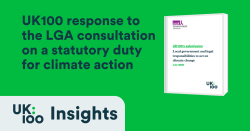As the only network of ambitious local authorities led by all political parties working together to tackle climate change, UK100 welcomed the opportunity to contribute to this important policy review. Our submission emphasises several crucial areas:
Empowering local authorities - Climate action is often deprioritised in the face of competing statutory duties, limited budgets, and other statutory functions. Giving it equal footing through a clear statutory duty—backed by dedicated funding, the right powers, capacity and delivery frameworks—would enable councils to plan, prioritise and deliver on their climate goals.
Co-design with local government - The duty should be co-designed with councils and local government representatives to ensure it is practical, proportionate, and aligned with local delivery realities. This includes establishing clear national-local delivery frameworks and avoiding fragmentation.
Dedicated funding and new burdens - It is critical that any new statutory duty related to climate action is accompanied by appropriate funding and resources. Without ring-fenced funding mechanisms that recognise the 'new burdens' doctrine, councils may struggle to meet new obligations whilst maintaining existing services.
Whole-council embedding - Climate duties should not be seen as the sole responsibility of the climate team. Instead, they must be embedded into the functions of relevant departments (housing, transport, planning), so that delivery is mainstreamed and shared across the organisation.
Partnership working - Local authorities cannot achieve system-wide climate targets alone. Explicit mandates for partnership working with other public bodies, the private sector, and communities are crucial to maintain momentum and avoid delays.
Preferred approach - UK100 supports a combination of specific duties around achieving targets or objectives (such as decarbonising local government estates) and specific duties around new tasks that contribute to objectives (such as developing area-wide action plans). Together, these approaches provide clarity of purpose while encouraging local ownership and integrated delivery.
UK100 strongly supports retaining the focus on both mitigation and adaptation, emphasising that while mitigation is often more clearly defined with targets and timescales, adaptation must be given equal attention with clear government guidance on expectations and timelines.
The consultation response emphasises that local authorities are best positioned to lead on climate action with their deep understanding of local needs, but require adequate resources, powers, and capacity-building support to be effective in this role.


